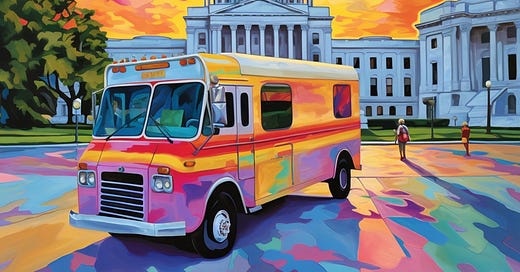Mississippi, Medicaid, and Mr. Softee
Public Policy as Social Engineering + Remembering B.B. King
If you’re not already a subscriber to Bastiat’s Window, please sign up for a free or paid subscription. (Paid really helps!) By all means, share the site and its articles with friends.
Below is an excerpt from my article, “Mississippi, Medicaid, and Mr. Softee,” published originally at Mississippi’s Magnolia Tribune, where I’m a regular columnist. The remainder of the article discusses the impact of Medicaid on health, the Oregon Health Insurance Experiment; a state-by-state comparison of at-risk rural hospitals, the dynamics of social engineering and its legislative equivalents, and questions for legislators and voters to think about when considering an expansion of Medicaid.
In 2009, Oregon’s Democratic Senator Ron Wyden told the Wall Street Journal, "Medicaid is a caste system. It is unfair to poor people and it is unfair to taxpayers." Paraphrasing Wyden, the article said Medicaid, “makes it hard for physicians to take care of the most vulnerable in society.”
Wyden was correct in 2009. His words remain correct today.
However, nine months after that article was published, Congress passed the Affordable Care Act (ACA), which included a massive Medicaid expansion. Since then, 40 states and DC have agreed to the expansion, with heavy pressure for the remaining 10—Mississippi included—to fall in line.
Advocates suggest that expansion will be inexpensive, improve poor people’s health, and save rural hospitals. Unfortunately, these claims crumble under scrutiny.
Even still, legislators will find it difficult to resist the expansion for the same reason that people watch Facebook videos while driving and argue ferociously with nasty strangers on Twitter (“X”). The same reason a tinkly melody lures me outside to buy ice cream from Mister Softee when my cardiologist has told me to lose weight. (Mississippians can substitute “Blue Bell” for “Mister Softee.”)
Like Facebook, Twitter, and Mister Softee, the ACA’s authors crafted the Medicaid expansion to be irresistible to state legislators—even those who agree that the program is unfair to poor people and taxpayers. To understand how, let’s start with some history.
The ACA became law in 2010, but from 2007 to 2009, much betting in Washington focused on a different proposal, “Wyden-Bennett” (named for Wyden and Utah’s Republican Senator Robert Bennett). Far more radical than the ACA, Wyden-Bennett attracted support from Republicans, including Mississippi’s Trent Lott.
Wyden-Bennett would have shifted people from employer-sponsored policies into an individual market, where people would have shopped for health insurance as they do car and homeowner’s insurance. Wyden-Bennett would have eliminated Medicaid altogether, with subsidies enabling lower-income Americans to purchase the same health insurance policies as their wealthier neighbors. Then, patients of modest means wouldn’t face doctors saying, “Sorry. We don’t take Medicaid patients.”
I didn’t support Wyden-Bennett, but was impressed by its ambition and intellectual coherence. Despite bipartisan support, it didn’t happen. Instead, Washington lobbyists conducted a months-long quilting bee to stitch together the ACA—a messy patchwork comforter to keep interest groups snug and warm while crowding more Americans under the thin blanket of Medicaid.
[The full version of this article is also “Mississippi, Medicaid, and Mr. Softee,” and is found at Magnolia Tribune—a really fine news outlet.]
LAGNIAPPE
“B.B. King Remembers.”
And I remember B.B. King—two times in person. This 5-minute video reminds me how lucky that makes me and what I liked so much about him, music aside.
My article above deals with Mississippi, poverty, health problems, and humanity, so I’ll devote today’s LAGNIAPPE to B.B. King, who knew all four of those and discusses them in the video above, courtesy of the Mississippi Blues Trail YouTube channel. I had the privilege of seeing two B.B. King performances, 35 years apart.
On June 23rd and 24th of 1972, a week or two after graduating high school, I saw King perform at the Hampton Jazz Festival in Virginia, along with Cannonball Adderley, Art Blakey, the Dave Brubeck Trio, Kenny Burrell, Ray Charles, Paul Desmond, Dizzy Gillespie, Roy Haynes, Illinois Jacquet, Herbie Mann, Al McKibbon, Thelonious Monk, Gerry Mulligan, Joe Newman, Nina Simone, Zoot Sims, Jimmy Smith, Sonny Stitt, Clark Terry, The Giants of Jazz, and Kai Winding. I don’t recall how much the tickets cost, but, astonishingly, they were cheap enough for four broke 18- and 19-year-olds to afford. (We didn’t have enough money for a hotel room, so we slept in the car Friday night.) Looking back, it’s almost impossible for me to believe that a kid like me saw that much talent in one weekend.
I particularly remember B.B. King, playing one of his famous Gibson guitars, all of which were named “Lucille.” (The reason for that is found on the historical marker below.) He was 46 years old, with more energy than a freight train, but so, so gentle in his manner. His good nature just enveloped the Hampton Coliseum.
I saw King perform one more time, in Richmond, Virginia, on (I believe) February 17, 2007. If that date is correct, he was 81, wracked by diabetes and other illnesses, and barely able to leave his chair. But his playing and singing were as powerful as they had been back in the day, his charm had not faded one iota, and he treated us to almost three hours of pure bliss. I imagine he was playing a different Lucille, but she sounded as good as her long-ago predecessor.
Thank you for all that and more, Mr. King.







I got to see B.B. King once, at a blues/R&B one-night festival. The only other act I remember was King Floyd ("Groove Me, Baby"). But Big Mama Thornton came out and did a couple of numbers with B.B. Lucky, lucky me!!!
I was lucky enough to see BB King live twice, once in the early 70s and once in the late 80s. He was every bit as great as everyone says.